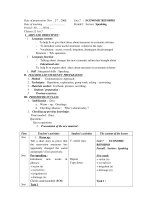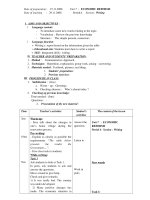7494 lesson plan
Bạn đang xem bản rút gọn của tài liệu. Xem và tải ngay bản đầy đủ của tài liệu tại đây (260.91 KB, 13 trang )
Lesson: - The Great Race
No. of Periods: - 5
Factual Reading
Learning Outcome:
Students will listen to a read aloud and interpret information within the story.
Students will understand the elements of a story.
Students will respond to the questions from the teacher and discuss ideas with each other.
Skills developed:
Reading, listening and thinking skills.
Resources required:
Crescendo curriculum, chart, story map worksheet/handout.
Getting started: - (5 minutes)
Read the lesson aloud and ask the students to listen carefully.
The Inquiry Process: - (30 Minutes)
Open the lesson with a brief discussion about the parts of a story (beginning, middle, end, and the
setting), about character traits, and how sometimes there are problems in a story. Talk about the
problem faced by the motorcycle in the story. Discuss with them the possible solutions. Introduce
how we are going to bring all these elements together in our story map. Explain that an important
event can also be a problem of a story.
Activity:
Divide the class into four groups. Let the members of each group read the lesson silently. Then
they discuss the story among the team. Let Team 1 discusses about the setting of the story, Team 2
will talk about the main characters of the story, Team 3 identifies a problem in the story and
informs Team 4, who will then find a solution for the same. All the four teams will compile their
information on a big story map on a chart.
Have students work on the story map handout. They will fill in the map on the story's characters,
setting, problem, important events, and solution.
Closure: - (5 minutes)
Students are given a story map template.
Assignment: Complete the exercises on page no. 13 and 14.
Assessment: - Students will be assessed on their reading skills.
Day 2- Pronouns
Learning Outcome:
•
•
•
Students will be able to define a pronoun.
Students will be able to distinguish a pronoun in a sentence.
Students will be able to write their own sentence using a pronoun.
Skills developed:
Thinking and speaking skills.
Resources required:
Ball, Crescendo curriculum
Getting started: - (5 minutes)
Ask children what are other ways of addressing people other than calling out their names. Like:Rani is going to the park.
Ramesh is singing a song.
The Inquiry Process: - (30 Minutes)
Pronouns are words that can take the place of nouns. When talking about yourself, you would say
"me" or "I" instead of your own name.
Wrong: Rita called Sameer to ask Sameer if Sameer could meet Rita at the park. (This sentence
doesn't make sense - no pronouns.)
Correct: Rita called Sameer to ask him if he could meet her at the park. (Substitutes the pronouns
him and he for Sameer, and her for Rita.)
Then tell them about singular and plural pronouns. ‘It’ is a singular pronoun and ‘they’ is plural
pronoun. ‘It’ is used for things and animals whereas ‘they’ is used for people.
This is Namita’s pen. It is blue in colour.
They are going for a movie tonight.
Activity:
Arrange a ball and make children stand or sit in a circle. Randomly toss the ball to the student and
have them say a sentence with at least one pronoun in it. Once they complete the task have them
toss the ball to another student and so forth and so forth.
Closure: - (5 minutes)
What is a pronoun?
Give an example of a singular pronoun and use it in a sentence.
Give an example of a plural pronoun and use it in a sentence.
Assignment: - Worksheet
Read each sentence. Choose the correct pronoun. Be sure to use a capital letter whenever required.
Assessment: - Assess students based on their knowledge and usage of pronouns.
Day-3 Using Instructions
Learning Outcome:
Students will understand what instructions are.
Students will recognize the importance of sequencing them.
Skills developed:
Listening, speaking and writing skills.
Resources required:
Piece of cloth for blindfold, crescendo curriculum
Getting started: - (10minutes) ‘Leading the blind’.
Teacher teaches pupils to play the game 'Leading the Blind':
Blindfold student A and make him stand at a certain position in the classroom. Then, get him to
turn round twice. Get student B to stand at a corner of the classroom. Place obstacles (tables and
chairs) between students A and B. Student B is to give instructions to student A to move towards
him, without bumping into the obstacles.
The Inquiry Process: - (30 Minutes)
Teacher discusses with students on the importance of instructions. Ask students
I. What happens if the instructions were unclear?
II. What happens if the instructions were wrongly sequenced?
Teacher explains that the instructions give the recipients information on how something should be
done in order to achieve a goal. Teacher to give examples of instructions: recipes, origami, etc.
Teacher also highlights that written instructions can involve number sequencing or words such as
'First', 'Next', 'Then', 'Finally', etc.
Activity:
Give each child A4 size paper with a picture. Tell them that you are going to give some
instructions which they have to listen very carefully and draw accordingly in the paper.
Instructions: - Draw sun and colour it. Draw mountains, and birds flying high in the sky. Draw
another boat with a man. Draw water. Colour the complete picture.
Closure: - (5 minutes)
Collect the worksheets and display it on the bulletin board.
Assignment: - Cut and paste worksheet
Day-4
Learning Outcome:
Students will learn about -oo-, -ee-, and –ea- words.
Students will identify the word with the given sound in a sentence.
Students begin to understand which words contain which spelling alternatives.
Skills developed:
Organizational skills, thinking skills.
Resources required:
Old newspaper , magazine, flash cards with -oo-, -ee-, and –ea- sound words, crescendo
curriculum.
Getting started: - (5 minutes)
Write the words ‘smooth’, ‘food’, ‘pool’, ‘book’, etc on the blackboard. Ask the students how
many vowels and consonants are there in these words.
The Inquiry Process: - (30 Minutes)
Say the word ‘smooth’ aloud. Show the flash cards and ask them to repeat each and every
word twice or thrice. Demonstrate the pronunciation of the word. Show the flash card with
the ea sound on it - ask students to say the sound and to give some ea words. Then show
the flash with the ee sound on it, explain that ee sounds the same as ea but is used in
different words - can they think of any?
Activity:
Split the class into three groups - the 'ea' group, the ‘oo’ and the 'ee' group. Give them the
template as per their group. Distribute newspaper old magazines among them. Ask the pupils to
write as many words as they can from the newspaper and magazines. Then check out which team
has collected maximum no. of words.
Closure: - (5 minutes)
Display the work done by the students.
Assignment: - Worksheet









